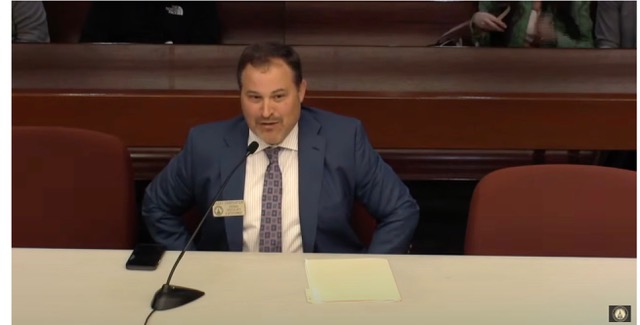
Hearing, 1:00 PM Room 606, CLOB Feb 22, 20
HB 131 “Opportunity Tuition” for “Opportunity Students.”
Video here.
Audio on the bottom.
Transcript by Rev.com. My cost $120.00 and 11 hours.
HB 131, Chairman Carpenter.
Rep Kasey Carpenter (R), Dalton, (Chair of a different committee) bill sponsor:
Thank you, Chairman, committee. We have before you LC491330S. This is language that we protected over the interim, I believe, on this important matter I think, for the workforce of Georgia. Um, it is very similar to, um, to what we’ve done in the past, but I just want to walk you through the bill real quick. I know time is of the essence, uh, on a lot of issues. But basically, this bill would help, help Georgia’s workforce.
There’s a, uh, roughly 19,800 individuals with, uh, the status of DACA in our state, um, that ranges between the ages of 15 to 41 that currently, um, do not have the opportunity in the State of Georgia to attend certain colleges within our systems at an affordable rate, and so that’s what this bill seeks to address.
Um, just a little bit of highlights of what this bill does, does do. All right, this bill would allow individuals that have been in the State of Georgia since 2013 that have received their DACA status, that have not committed a felony or high, high aggravated misdemeanor, to attend certain colleges or in certain programs within those colleges at a rate that is more than in-state but obviously less than out-of-state. That rate would be set by the Board of Regents, um, on an individual at university or college basis, um, depending on their actual cause for that in-, for that institution.
We have talked about the declining, uh, enrollment in our colleges, um, across the state for some time. We have talked about border waivers that we offer to kids from Florida, from Tennessee, from Alabama, from South Carolina, and this piece would allow kids that have gone through our K-12 systems that have graduated that want to continue on in their educational process to attend them at a rate that’s affordable.
I have Dalton State in my community. Uh, for a DACA recipient that graduated form Dalton High School is a valedictorian to d-, to attend Dalton State, it’s $15,000 a year. So what happens is these kids leave the State of Georgia, they go to other states to, to pursue higher ED opportunities, where after a year they can receive that in-state tuition in c-, in certain areas.
And so the, the, the key is, is what do we need to do as a state to make sure these individuals that are high achievers stay in our state so they can add value to our workforce? For you that are not familiar with the DACA program, um, it does require them, it give them a TIN number so they are able to work, legally work, legally get a driver’s license to, to, to go back and forth to work and to school, and so and then would be required to pay taxes on income in the State of Georgia and federally.
So this, these are our Georgia tax payers, or will be Georgia tax payers when they’re, you know, they’re 15 when they’re out of school. Um, and I think it’s a great opportunity to offer these folks, um, education to make them achieve what they can achieve, because I’m a firm believe, uh, we can fight all we want to about immigration, but I’m a firm believer that these individuals are here to stay, and the Federal Government will not, uh, load all these individuals up and take them back to their respective countries that they really don’t know because they’ve been here since 2007.
So, um, without, without really beating the bill to death, that’s really what it does. There’s sections in here about USG and for technical college. It makes sure that it applies to both. Um, and without, I’ll be glad to take any questions without holding you up too long.
Chairman Chuck Martin:
Thank you, Chairman Carpenter, you have two. Um, Dr. Clark, [inaudible 00:04:04] number 4. Dr. Clark.
Dr. (committee member/Rep) Jasmine Clark:
Um, thank you, Mr. Chair. Thank you so much for bringing this bill. Um, I just have a couple questions. The first question is line 99. I know, uh, prior to the sub, the um, the range f-, or there was a range instead of it being 110% of the, uh, in-state tuition, it was 101-110. How did you all fall on the 110%.
Chairman Carpenter:
I think we just … I d-, I think we wanted to be clear that in the State of Georgia we were, we would allow this opportunity, right, but we wanted to make sure that it wasn’t so close to the in-state, right, that it would create problems and issues, and like most legislation, y-, y-, you, you change, you, you do what you can to make sure you get it across the finish line, and that is what this piece would address.
Dr. Clark:
All right, thank you. And um, uh, a followup question. Um, a little, uh, I guess, concerned about, um, in line 102 where we say priority, consideration, uh, to enrollment applications, and then it lists like who gets priority. Um, um, are there any concerns about that being constitutionally, like a little iffy, because it could been seen as discrimination.
Chairman Carpenter:
Uh, I, I think that, um … I- I- I personally don’t think so. Obviously, I’m not a constitutional scholar, but I think the, uh, the intention of the paragraph is to say, look, we’re going to check in-state first, out-of-state second, opportunity students third. Uh, it’s just to make it very clear that American citizens are first, and the the, and the opportunity citizens are second. And I think that’s an important pieces, um, if you look across the landscape of the country, that’s a p-, that’s a pretty important piece for the longevity of this legislation.
Chairman Chuck Martin:
If, if I … If I may Dr. Clark, as well, let me address that. I- I edited that language, um, after talking with somebody. It’s a bit of a belt and suspenders situation in that, um, if, if you’re, in order to be an eligible institution you cannot have turned away applicants, qualified applicants in the last two academic years, but th-, this is just a belt and suspenders, you know, put right there in black letter law that, um, um, you are going to give priority to in-state and out-of-state. Again, if you’re turning anybody away, you, you were eligible in the first place, so this wouldn’t apply.
L- let me sound just for the committee here too. S- somewhere in the, the creation of, um, um, the, the sub, uh, we, we have, um, um, created on lines 133 CCSG, and on line, um, 49, that, that should read, uh, uh, multiply times, um, undergraduate in-state tuition. Um, that, that was, um … A- and, and, um, line, line 43, the opportunity t-, tuition, you know, it’s, it, that’s basically, uh, I think everybody is reading it the way it’s supposed to be r- read, but it, it’s technically [inaudible 00:07:14].
The, the opportunity tuition is 110% of in-state tuition, not 110% of out-of-state tuition. Just, uh … W- we’ll, we’ll have to correct that, this first hearing on the bill, but-
Chairman Carpenter:
That … That’s right, and then I think-
Chairman Chuck Martin:
[inaudible 00:07:26] I think the ch-, the gentleman had corrected that in one of his subs, and then I think when, uh, the second sub was made that it was, it was [inaudible 00:07:31].
Chairman Carpenter:
Yeah, so I mean … I- I think that the point is, right, and it, and it’s already been addressed in the uh, there’s a lot of naysayers out here on this legislation that say these are going take others, other citizen, Georgia seats in, in colleges, and that’s not what this does. This bills says that if this university or college has capacity, then they can attend and fill those empty seats.
Uh, you’ve heard the chairmen in the past talk about the airplane scenario, right, where you’ve got an airplane going from Atlanta to Arizona, uh, you’ve got five empty seats, is it worth selling those five seats at a, at a, at a different rate just to fill those seats? And I think that’s the, that’s what this legislation, not only helps the workforce but also fills seats in the universities, colleges.
Dr. Clark:
Thank you, um, Mr. Chairman, and thank you for bringing this, uh, piece of legislation. I kn-, remember going down to, uh, Dalton State for a visit, and I know that Dalton State has a, uh, a great success, um, rate with these DACA students.
Chairman Carpenter:
Yeah. Yeah. It’s … It’s a, uh, Dalton State’s, uh, one of Georgia’s few Hispanic institutions, um, and rec-, received federal funding for that, and uh, obviously it’s something that, uh, you know, as a community it’s important to us. We have a, my district’s 51% Hispanic, and so having an educated, uh, workforce is important for Northwest Georgia and, and the whole state for that matter.
Dr. Clark:
Thank you.
Chairman Chuck Martin:
No further questions. If there are no further questions we’ll move on, move on to testimony. I’ll … I’ll note on the item. Okay, we, uh … We have about 15, uh, people. We, we have about an hour left. Um, so we’re, we’re going to ask you, everybody, to keep, because we have two more bills, um, keep their comments to the two or three minutes. Mr. King.
D.A. King – Dustin Inman Society:
Good afternoon, Mr. Chairman, members of the board. My name is D.A. King and I am president of an organization that is 501C4 non-profit according to the IRS, and our goal is to make Georgia as unattractive to the organized crime of illegal immigration as possible. I came today to represent a lot of people who want this bill to die right here in this room for the following reasons. There’s a strong ad argument going around that there’s concern about illegal aliens with DACA taking up seats, making those seats unavailable to Americans and legal immigrants. That’s not the argument.
The argument is, and it’s impossible to deny, that this opportunity tuition bill is in fact creating opportunity for people in the country illegally, no matter whose fault that is. It is unavailable to Americans and legal immigrants who didn’t migrate to Georgia. I have friends in Michigan and in California who want to come to school at KSU, they cannot afford the tuition. What you’re doing with this bill is considering whether or not you will vote to give opportunity tuition to people in the country illegally while it’s denied to those same Americans and legal immigrants.
There was a time in, in, on this campus where the majority of the legislators were what we call pro-enforcement. I- I don’t know if that’s sure anymore, or true anymore, but this, this bill was certain to be an indicator. Um, I- I also want to bring up, and I’ll be very brief, but I’ve been here a long time, and in 2012, now Congressman, then State Senator Barry Loudermilk passed a bill in the senate that said illegal aliens could not attend any USG or technical college system school. The compromise was made that people here illegally could attend a certain number of schools as long as those schools did not, or had not declined an application for enrollment. That was the deal.
The reason that you have the clause or see the clause in this bill that it, opportunity tuition is only available for attendance to schools that haven’t turned anybody away is a result o-, o-, of just what I told you, what happened in 2012. I can go on, but I want to make it clear one more time. The argument was never whether or not we’re going to have a limited number of seats, and people are going to, illegally going to fill them. That’s a strong an argument, it was never said. It is impossible to deny, deny one more time, that opportunity tuition does not create an opportunity for Americans and legal immigrants who want to come here.
The tuition at KSU, I did the math, I’m no wiz, but I double-checked it, 15 hour class load at KSU for one semester would come out to be $7000 more for my friend’s son to come here from Michigan to go to KS-, KSU than it would be for somebody whose in this country illegally. There’s a lot o people out there watching this bill, and a lot of us consider a decision to do this to be very, very un-American. I’d love to take questions, Mr. Chairman, if you have time. Thank you very much.
Chairman Chuck Martin:
Okay. If we have questions, thank you. Um, Ms. Staten, Straten, I’m sorry.
Kathy Statham:
It’s Statham.
Chairman Chuck Martin:
Statham, I’m sorry. Yes, Ma’am. Yes, Ma’am.
Kathy Statham:
Hi, Mr. Chairman, and committee members. My name is Cathy Statham, I am a legal citizen of the United States and I reside in Georgia. I am against this bill and I would like for it to be killed today. Uh, you’ve heard the old saying, “You could lipstick on a pig, but it’s still a pig.” We go over this almost every year, and this is just a different bill with a different name, uh, no matter what you call it. Uh, this bill, and these are my notes, but I want to make sure that I cover everything quickly, this bill is sep-, special opportunity to illegal aliens that is forbidden for other Americans that come here for education in our state.
In other words, if you live in Tennessee and you come to Georgia, you must pay out-of-state tuition. So why are we going to give any illegal priority over American citizens? So no matter what you call it, whether you want it to be opportunity this year, or next year, or whatever year comes up, American citizens come first. My taxpayer money should not be paid for any tuition for anyone that is in this country illegally. Thank you very much.
Chairman Chuck Martin:
Thank you, Mr. Straits-
Kathy Statham:
Statham.
Chairman Chuck Martin:
Statham. Yes, Ma’am. I’m sorry. David Garcia.
Uh, Chairman r-, two seconds while they’re coming up. Just-
Chairman Chuck Martin:
That way we’ll keep going. I’ll-
David Garcia:
[inaudible 00:14:35]-
Chairman Chuck Martin:
… write it down. We’ll get to you, we’ll, while [inaudible 00:14:40].
Speaker X:
All right, David.
Chairman Chuck Martin:
[inaudible 00:14:40]. We’ll get back to you. We’re going to … We’re going to stay on track.
David Garcia:
Good afternoon, Chairman and committee. I’m David Garcia, and I work for a 501C4 advocacy organization named GALEO Impact Fund, and we advocate for the Latino Hispanic community throughout Georgia, um, and um, I- I guess I’d like to start by saying that in-state tuition for DACA recipients or opportunity tuition is important for Latino voters throughout the state. Uh, and I’d also like to start by adding that DACA recipients are not here illegally. Um, so the organization that I work for, w-, we don’t support the, uh, the, the, the sub to bill in it’s current form, um, f- for a number of reasons, and I, I’ll list those reasons.
Uh, the current conditions on Georgia residency severely limit the number of people who have access, and uh, we don’t want there to be a second tier admissions process that it categorizes people by their tuition classification. Uh, the current continuous conditions on Georgia residency severely limit the number of people who have access since it’s tied to property ownership and Georgia, and getting, uh, Georgia ID, and we don’t want there to be a second tier admissions process that categorizes people by their tuition classification.
Um, with all that said, um, we, we, we think it’s great that, that this bill was introduced, and we think it’s a step in the right direction. Um, and I, I’d also, uh, like, like to bring attention back to the bill’s intended purpose, which, which is to develop our workforce and, and to support DACA recipients. And then I- I, I’d mostly like to focus on the supporting DACA recipients component. So the, the, the DACA recipients who are eligible for this bill are, are exceptional students. Uh, they have overcome tremendous challenges, and our state has already invested a considerable amount of resources in their K through 12 education.
Uh, they are not seeking a handout or entitlements, uh, they want the same opportunities as other Georgia high school graduates [inaudible 00:16:46]. Um, and, um, I- I-, I’d like to … I’d like to bring up, uh, two, two Georgia high school graduates and University System of Georgia graduates who, who are also DACA recipients who’d like to talk about their experiences.
Chairman Chuck Martin:
Well, we’re, we’re doing two minutes each, and you’re over yours.
David Garcia:
Okay.
Chairman Chuck Martin:
They’ve signed up?
David Garcia:
Yeah, they’re the next people on the list.
Chairman Chuck Martin:
[inaudible 00:17:07]. Then … Then we’re going to go to them.
David Garcia:
Okay. Thank you.
Chairman Chuck Martin:
I have Ms. Garcia.
Speaker X:
That’s right.
Chairman Chuck Martin:
Mr. Garcia? Miss? Okay. I’m having trouble. You, you wrote really fast and I couldn’t tell what the first name was. Yes, ma’am.
Maria Garcia:
[inaudible 00:17:21] Garcia. Hi. Uh, my name is Maria [inaudible 00:17:25] Garcia. I was brought to this country when I was only three years old. Um, that was 25 years ago. I am now 27. Um, I grew up in Georgia, Clayton County. I went to Thurgood Marshall Elementary, Morrow Middle, Morrow High. I graduated with over 4.0 GPA in the high school to my surprise. I, um, didn’t know. I wasn’t [inaudible 00:17:47] with it until I was in high school, until after I received DACA in 2013. Um, and everything I’ve paid in terms of tuition has been out-of-pocket, no handouts. Um, and as of recently, no loans.
So just to illustrate, I brought my 2016 tax statements. It’s a 1098T for Kennesaw State. I paid $22,640. Um, and in 2017 I paid $20,144. So hypothetically, um, I had not started, sorry, I went to Georgia [inaudible 00:18:21] the first two years, transferred to KSU. So if I’d done all four years at KSU, I would’ve paid over $80,000 dollars for a public school education. I am currently at my master’s program where each class is $4000, so if I wanted to take two or three classes, I would be paying around 8 to $12,000, uh, per semester, which is really hard, um, especially for someone who, um, doesn’t receive otherwise any type of private assistance, uh, in terms of, uh, scholarships, um, and someone who just doesn’t make enough.
I had to take private loans for this, which is the only reason I can continue my education. Um, and I’m a unicorn. I’m not … I c-, uh, I graduated college, but I am one of many, many, many DACO recipients who couldn’t even, uh, start the first semester. Um, thank you.
Chairman Chuck Martin:
Thank you very much. Um, Raphael. Raphael. Yes, sir. And, uh, it looks like it’s A-R.
Raphael Aragon, illegal alien:
Yes, yes.
Chairman Chuck Martin:
But pronounce your last name for me.
Raphael Aragon:
Aragon.
Chairman Chuck Martin:
Aragon, okay. We’re going to have to s-, get everybody to print in the future. Yes, sir. Go right ahead.
Raphael Aragon:
It starts with an A, but yes, it’s pronounced Aragon. Thank you for hearing my testimony.
Chairman Chuck Martin:
Yes, sir.
Raphael Aragon:
Um, my name is, uh, Raphael Aragon. Um, I came to this country when I was six years old. I’m a Georgia, I’m an undocumented Georgian, I’m a Georgia tax-payer. I’ve lived here for, uh, the vast majority of my life and I love this state. I love contributing to it. I love being a part of it. Um, I graduated from Dunwoody High School, uh, in 2015. When I graduated from Dunwoody High School, I came to find out that there were no schools in Georgia that were acc-, accessible to me, um, because of the cost, um, despite how hard I had worked in high school to graduate.
Um, luckily I was awarded a full ride scholarship to a school in Connecticut, um, where I met tons of incredibly bright, incredibly intelligent undocumented Georgians who had, uh, the same experience that I had. They left Georgia because there were no opportunities for us here. Um, through my, my, uh, bachelor’s, my undergrad, I, um, I, the organization that a- awarded my my scholarship gr-, um partnered with Oglethorpe University, um, and so I was able to return home to be with my family and study here in this great state. Um, but unfortunately most of my classmates, most my peers in Connecticut, uh, did not do the same.
Most of them stayed in Connecticut because they felt like it was a more welcoming and, um, supportive environment, um, and upon graduation many of them were, uh, scouted and, uh, uh, made offers by companies and organizations in the Northeast United States area, um, and they accepted those offers, uprooted their families from here, from Georgia, their small businesses, their, um, their whole entire economy they took from Georgia to this, the Northeast United States.
Um, so many of them graduated with degrees as engineers, um, computer science degrees, things that I think would be valuable to Georgia, um, and I think it’s an incredible, uh, and unfortunate loss of the investment that this state has made in us in our K through 12 education, um, to just allow these bright, in- intelligent people, um, who love this state and want to continue living here to go somewhere else. Um, I … That, that’s … That’s all I have. Thank you.
Chairman Chuck Martin:
Thank … Thank you very much. Thank you. Maria del Rosano. Did I get that right?
Maria del Rosario, legalized illegal alien and ethnic activist:
It was … It was close. Thank you, uh, Chairman. My name is Maria del Rosario.
Chairman Chuck Martin:
Rosario.
Maria del Rosario:
Uh, [inaudible 00:22:23], I am, um, here as, as a community member and also as a co-founder to Georgia [inaudible 00:22:30], a poultry plant worker advocacy group in Northeast Georgia. Um, I have a few points for consideration for the committee that I want to talk to about. As someone who formally wasn’t documented when I did my first two years of college, I think this is a tremendous initiative moving in, in a great direction. And I just wanted to point out three things in the substitute that I noticed. One, um, there is not a maximum tuition. Uh, maybe in the, um, in, in the update that was, was taken off, and I- I heard, uh, Chairman Carpenter discuss that that was an intention, right, to have a, a minimum and a maximum. Um, the maximum is not, uh, listed.
The second point is I want to talk f-, for consideration as someone who has worked in the university system. I used to be the Latino Success Coordinator a at the University of North Georgia. Oftentimes, students would have issues proving continuous Georgia residency or even residency period if there were dependents because their parents, uh, don’t have an ID or don’t have property that they own in Georgia. So just to increase access, I would consider either adding in language or modifying that, so that no, um, person under the age of 24 is discounted because their parents can’t prove continuous Georgia residency because maybe they’re out of status.
My third and final point is the, uh, um, the admissions second tier classification, I heard you loud and clear when you said this is supposed to be a belt and suspenders type of addition, however, I am concerned that there might be misclassification of students into this, um, category because as it is, DACA, when you get DACA, you get an EAD, right, you get the work permit and it doesn’t say on their DACA. Other folks who have [inaudible 00:24:13] also have, uh, a- a work permit, and folks of varying, uh, statuses, I would just hate for they, there to be a second tier system where folks are inadvertently placed to wait until other, um, until other, you know, folks either accept, reject, or defer. And that actually happens with US citizens currently.
I’ve been an advocate in five different universities where, uh, US citizens were placed on out-of-state tuition, uh, classification because their parents couldn’t prove residency. So those are the three things that I would just ask for consideration to be modified. I think this initiative is great, and I’m looking forward to what the committee does. Thank you.
Jaime Rangel, former GALEO staffer, illegal alien and registered anti-enforcement lobbyist for FWD.us:
Good afternoon, Mr. Chairman and members of the committee. My name is Jaime Rangal. I am the Georgia State Immigration Director for FWD.us. We are a national bipartisan organization that focuses on breaking through political gridlock to find bipartisan solutions to our broken immigration and criminal justice system. Um, as an organization and as someone who is a DACA recipient, I want to applaud Representative Kasey Carpenter for this bill. We support the bill. We support the legislative process that this bill is going to go through, and we’re here to be a resource.
Um, I was brought to this country when I was only an infant. In fact, the first steps that I took in this country were on American soil. I was a Boy Scout, and I grew up, pledge allegiance to this day, will stand and pledge allegiance [inaudible 00:25:36]. Right now in Georgia, we have a workforce shortage, and we have students who want to go to school. And make it … I want to be clear here, we have lawful presence here. [inaudible 00:25:47] and during the Trump administration, the Biden administration, w-, and Obama’s administration, we came out, out of the shadows and showed the government who we are, and what we’re showing the government right now in the state is that right now in Georgia, we have spending, we c-, we have a spending power of $624,000,000, we contribute in taxes $77,000,000 in state and local taxes.
We just had a young lady right here presenting her proof of tax, of her proof of, of tuition, which therefore she has to pay taxes, and of course she’s working, so we’re paying taxes. So we support this bill. Georgia has a [inaudible 00:26:19] shortage, l-, this is the solution right here. This is a workforce bill and we support, um, the legis-, the legislative process that it is going to go through. And I am happy to be a resource to anyone here in this committee, and I applaud the work that’s being done here. Thank you so much.
Chairman Chuck Martin:
Thank you, Mr. Rangal, and I apologize, uh, for [inaudible 00:26:36] your first name there. Thank you kindly.
Jaime Rangel:
Uh, it’s okay. People call me Jaime here too, so, uh, I’ve been here for seven years, so-
Chairman Chuck Martin:
Thank you very much.
Jaime Rangel:
… it doesn’t matter. Thank you, Chairman.
Chairman Chuck Martin:
My apologies. Uh, Jim Hollingsworth.
Jim Hollingsworth:
Thank you, Mr. Chairman, committee. Uh, my name is Jim Hollingsworth. I am, uh, I lead a local Christian ministry called Path United, and I’m here to speak in support of this bill as well. Um, I applaud Representative Carpenter and his hard work on this, um, bill. I work alongside about 600 Latino immigrant families and children, uh, through after school community based ministry, and we’ve been doing so for about 13 years. And I just wanted to come and speak on behalf of, of my friends and my coworkers who are DACA recipients who just want an opportunity to go to school, um, and, and provide for their families.
So our organization is all about helping young people flourish, and I believe that that is what the role of, of government is as well. It, it’s to help young people flourish and, and I believe that this bill gives the opportunity for young people to be able to to take a step after high school and go to college. And so, I’m a fifth generation Georgian, I’ve been here my whole life. Um, my relationships with these DACA recipients have changed my life for the better. They love Georgia as much as I do. They are, uh, committed to being here, to raising their families.
Everything I’m hearing today about workforce development, it makes total sense to me, uh, that we’re going to give opportunity for more young people to be able to go to college in this state. So thank you so much for the opportunity to be here and share in support.
Speaker X:
[inaudible 00:28:22].
Chairman Chuck Martin:
It’s Serrano, and I can’t read the, uh … You write tiny. I can’t read … So just give us, uh, your, your name for the record [inaudible 00:28:32].
Geovani Serrano anti-enforcement organized at the Marxist GLAHR in Gwinnett Co.:
Yes. Um, good afternoon. Um, um, my name is Geovani Serrano. I am a community organizer at the Georgia Latino Alliance of Human Rights. Lar-, um, HVA131 is taking a positive step in improving equity and education for all Georgians. HVA131 is a forward step to alleviate the enrollment issue of the, that Georgia’s public universities are currently facing. [inaudible 00:28:53] the states that have passed tuition equity legislations or policies claim, have claimed, that the expenses occurring there now has been [inaudible 00:29:00]. In-state tuition [inaudible 00:29:02] percentage is not [inaudible 00:29:04] free tuition. Although it is a relief, the money the students pay boosts school revenues-
Speaker 1:
… because it’s money that institution wouldn’t otherwise get. The fact is that educating all young people is essential, uh, for the state and the country’s economic future. Experience in the state that have [inaudible 00:00:10] tuition equity laws or policies against that, social policies help United States citizens, immigrants of all statuses, by reducing the high dropout adults- dropout rates, increasing the number of graduates who pursue a college degree, raising the students’ incomes and tax contributions at [inaudible 00:00:26] an array of other economic and social benefits. College graduate students who would land well-paying jobs will raise their income and tax payments, and can entice [inaudible 00:00:35] educated workers to the state.
Around 3,000 local [inaudible 00:00:41] adults between the age of 18 to 29 in Georgia will be, uh, bene- will benefit from the in-state, uh, for in-state tuition plus the percentage. It could benefit 3,000 students, uh, graduating from Georgia high schools every year. However, it is important to give all Georgia the opportunity for higher education.
The fight for in-state tuition have been for many years, and is important that we introduce legislation that respect the struggle of the students that ha- gave courage to many of us to continue moving forward despite the obstacles at hand. We cannot limit the students who will benefit from this legislation by requiring continuous domiciles since [inaudible 00:01:14] 2013. UCIS has stopped, uh, processing new applications since 2017. This is close to 30,000 undocumented students graduating from Georgia high schools every year. Or any other student who’s not able to econ- to prove a- prove a continuous domicile in the state.~
Um… and, uh, I think that, uh, as- as somebody has discussed, uh, Section 505 of the Illegal Immigrations Reform Act, uh, IIRIRA of 1996, prohibits, it prohibits, uh, that, uh, any higher education benefit based on residence to undocumented immigrants unless they provide the same benefit to United States citizens in the same circumstances, regardless of their residence.
Uh, the p- the other states that have provided tuition have gone to the courts, and the courts have confirmed that the state that provides the tuition to students who meet certain criteria regardless of their immigration status, have fully compile- com- complied with this prohibition. This law is very specific.
Chairman Chuck Martin:
If-
Speaker 1:
It does not preclude states from providing same tuition to undocumented student residents-
Chairman Chuck Martin:
If- if I may-
Speaker 1:
… unless they’re-
Chairman Chuck Martin:
If I may, just in order for us to-
Speaker 1:
Yeah.
Chairman Chuck Martin:
… sounds like you- you’re providing some good information. If I could ask you to submit that to- to our office…
Speaker 1:
Okay.
Chairman Chuck Martin:
And- and lo- and, just in keeping- keeping fair here, you’re, uh, quite a bit over the two minutes, so…
Speaker 1:
Okay.
Chairman Chuck Martin:
Good information, if you were to, you know, provide that to our office, we’ll make sure we-
Speaker 1:
Okay.
Chairman Chuck Martin:
… we provide that to the members.
Speaker 1:
Okay. Sounds good.
Chairman Chuck Martin:
And thank you, sir.
Speaker 1:
Thank you.
Chairman Chuck Martin:
Thank you. Um.. Veronica Maldon… M- Ma- Maldonata…
Veronica Maldonado-Torres:
That’s okay.
Chairman Chuck Martin:
Help me out.
Veronica Maldonado-Torres:
Veronica Maldonado-Torres. Good afternoon.
Chairman Chuck Martin:
Thank you very much. I just, I’m just a country boy from North Georgia, so I-
Veronica Maldonado-Torres:
That’s all right.
Chairman Chuck Martin:
… I appreciate you very much.
Veronica Maldonado-Torres:
I appreciate you trying to say it. I appreciate it.
Chairman Chuck Martin:
Yes, ma’am. Thank you.
Veronica Maldonado-Torres, GA Hispanic Chamber of Commerce:
Yes, sir.
Uh, good afternoon, Chairman Martin and distinguished members of the Georgia House, uh, Higher Education Committee. My name is Veronica Maldonado-Torres, president and CEO of the Georgia Hispanic Chamber of Commerce, representing over 1,000 Hispanic businesses, uh, and many in our workforce, you know, the Georgia Hispanic, uh, community representing 1.1 million Latinos in the state of Georgia. I’m here today, uh, representing the Hispanic business and workforce voice, uh, in support of Georgia House Bill 131, the Workforce Development Act, on behalf of the Georgia Hispanic Chamber.
Um, as you know, the US is facing a national labor shortage, and Georgia’s not immune to the impact of the workforce issues. Uh, Georgia businesses are facing critical labor shortages in skilled industries like education, healthcare, and, uh, information technology. To help combat this, we must cultivate our future workforce to help stimulate the economy and meet the needs of businesses here in the state of Georgia.
Uh, HB 131 can help us achieve this, uh, they’ll- s- this legislation will expand higher education opportunities for Georgia’s more than 20,000 Deferred Action for Childhood Arrivals, DACA, program recipients, allowing them to build the skills, uh, and knowledge to help them better serve the Georgia job market and our businesses, all of our businesses. Uh, already 20 other states, uh, have extended in-state tuition rates to include all students with established residency, and Georgia is unfortunately falling behind on this one.
Uh, we’ve had the highest percent increase, uh, rate in job openings across the US, but we need this skilled workforce to fill this position, um, and the gap is leaving Georgia business community truly at a disadvantage, uh, compared to other states, and it’s hurting our economy. Uh, bridging the skill gap and creating a collective of professional leaders to fill the jobs in Georgia will ensure our economic growth and help us address our labor shortages.
Um, more education opportunities for Georgia students and workers are gonna hel- help strengthen our talent pipeline, and provide us with the skills that needed to f- fill these long-vacant positions across the state. We heard from the Federal Reserve that the gaps between, uh, jobs and people continue to widen. Um, this is an incredible opportunity at a time when businesses need a skilled workforce, um, to ensure that the students have the access, um, capable to achieve that.
This bill is crucial to strengthening our economy, um, and fulfilling this critical position gap, um, across Georgia’s majors industries, and if we prioritize education, and allow greater access to the labor force of the future, we can assure sustained economic growth for the state and successfully address our workforce crisis.
So, we hope to support the passage, uh, of HB 131 to ensure Georgia has a skilled workforce to keep our economy strong and meet the needs of the future. Thank you very much. Veronica Maldonado-Torres with the Georgia Hispanic Chamber.
Chairman Chuck Martin:
Thank- thank you, Ms. Maldonado-Torres. See, I can be coached.
Uh, Darlene Lynch. Ms. Lynch, we’re gonna have to get you to improve your penmanship as well. So, uh… (laughs)
Darlene Lynch, founder & chair of the “BIG” refugee first/Ga Chamber coalition & organizer for a GA Marxist lobby to put refugees in line before Americans:
Sorry about that. (laughs)
Chairman Chuck Martin:
No, qu- quite all right. (laughs)
Darlene Lynch:
Thank you, Chairman, and thank you, committee. My name is Darlene Lynch, I’m the chair of the Coalition of Refugee Service Agencies and the chair of the Business and Immigration for Georgia Partnership, the BIG Partnership. CRSA is the oldest and largest coalition in the state, serving Georgia’s refugee and immigrant communities with 25 organizations providing education, training, English learning, and job placement services to many thousands of foreign-born Georgians every year.
The BIG Partnership, we created that in 2020 to partner with Georgia’s business community to find ways to tap into the deep but really underutilized pool of talent that we have in our refugee and immigrant communities. And in 2021, we worked with the bipartisan House Global Talent Study Committee, and they provided a roadmap to maximizing this global talent that we have here in Georgia and meet the needs of today’s workforce and the workforce of the future. Their number one recommendation was to remove unintended barriers to admission at Georgia public colleges.
Today, BIG has more than three dozen members and is rapidly growing. And you might say, “Why?” Why are we growing so rapidly? What is bringing businesses to BIG? And that’s the workforce. As we just heard, we have a workforce shortage that is hurting our business community. I just spoke with the top HR officer of a major car manufacturer here in- in Georgia who can’t find good people to enter their technician training program. And he came to us because they want people who have a desire to learn, the drive to work, and the willingness to take risks. And they believe those are qualities of immigrants who come to Georgia in search of the American dream.
And so I rise today to applaud your work in the off-session to find answers to the workforce crisis, and support your efforts to build a global talent pipeline by improving access to higher ed. And we hope that HB 131 will successfully lead us down that path.
I wanna say one o- few- couple of other things. Today we heard from some folks opposing this bill. Um, today, one in ten Georgians is an immigrant. Georgia’s different. Those numbers are going up every single year. We have more and more immigrant youth ready to enter our workforce than we have the day before yesterday. 85% of Georgia voters support immigration reform at the state level to meet our workforce needs, 85% of Georgia voters. We have had bipartisan support for o- our measures for years now, and that was including last week, we had more than 300-
Chairman Chuck Martin:
M- Ms. Lynch, um-
Darlene Lynch:
… Georgians here-
Chairman Chuck Martin:
Please, c- please complete.
Darlene Lynch:
… and a bipartisan resolution signed by the speaker of the House in support of refugees and immigrants in Georgia. This is a new Georgia, and one that we can help grow with a bill like HB 131. Thank you.
Chairman Chuck Martin:
Thank you, Miss Lynch.
Carolina- Carolina Ramos.
Carolina Ramos, lobbyist for the Marxist Latin American Assoc.:
Good afternoon, Chairman Martin and members of the committee. My name is Carolina Ramos, and I’m the director of advocacy and outreach at the Latin American Association, which is the largest and oldest Latino-serni- serving nonprofit here in Georgia. We just, um, celebrated our 50th year anniversary.
Um, as the oldest and largest Latino-serving nonprofit, we have served many DACA recipients throughout the years and have seen their contributions to our community around the state. They have come back and volunteered orga- at our organization, have given, um, talks to a lot of our youth, and are constantly encouraging our organization and assisting those across the state. They are part of what makes, not only makes this state great, but country great, and have accomplished what our organization stands for: to adapt, integrate, and thrive.
Thousands of DACA recipients call Georgia home and have lived here the majority of their lives. They work, pay taxes, and contribute to the state. As we’ve heard before, they’ve contributed thousands, millions, billions of dollars to Georgia’s economy, paying more than 77 million in state and local tax revenue. Our organization supports this legislation, since it ensures DACA recipients can have access to higher education and further their contributions to this wonderful state. Failing to provide Georgia DACA recipients with access to tuition equity is an economic- has economic consequences for the entire state.
Lastly, I wanted to thank Representative Car- Carpenter for your leadership on this, and the LAA supports this bill and the legislative process. Thank you.
Chairman Chuck Martin:
Thank you. Jennifer Lee.
And- and, uh, yeah, if people are back in the corner, I need to give Crystal Munoz, you’re, uh, you’re next. I’ll give you a, give you a, um, heads-up. Yes, ma’am.
Jennifer Lee (“Fake Fact Lee”) – Director, the Marxist Asian Americans Advancing Justice Atlanta:
All right. Good afternoon, Chairman Martin and members of the committee. My name is Jennifer Lee, and I am the policy director of Asian Americans Advancing Justice Atlanta. We are a legal, uh, a nonprofit legal advocacy organization dedicated to protecting the civil rights of Asian Americans, Pacific Islander, and Arab, Middle Eastern, Muslim, and South Asian communities in Georgia. Um, along with our policy advocacy work, we have a legal services department where our attorneys assist individuals, actually, with their DACA applications and renewals, and also assist immigrants who are are lucky to have pathways to citizenship to become US citizens.
Um, we believe that all Georgia residents, including those with DACA and undocumented youth and young adults, are Georgians, and that they do deserve access to the same tuition rates. I would just ask that the committee expand their vision around this issue a little bit. Um, nearly half of states already provide access to in-state tuition rates to all residents, regardless of immigration status. This bill is limited to those with DACA, and it does potentially lower financial barriers, um, but not remove them. It includes longer re- residency requirements for those with DACA than the, um, um, and- and it theore- theoretically puts them last in the admissions line. So in short, the bill does not treat all Georgia residents equally.
I would like to, uh, underscore a couple of concerns that have come up. I still have a concern with the new language in the bill, with the opportunity tuition rates specified at a minimum of 110%, but, um, no maximum listed. And so without the maximum, I just worry that the bill loses its structure and its impact, and ask that that be clarified if possible, um, so that the intent of the bill is clear.
And then I also really appreciate the chairman’s intention of moving this bill forward, um, but I do still have some concerns about the newly-inserted language about college admissions practices. Uh, I think that’s potentially a little problematic or confusing. And just as background, um, a couple years ago, there was a bill on the Senate side, that, um, mandated certain in-state, out-of-state tuit- um, in-state and out-of-state percentages for, uh, newly-admitted classes, and, um, the presidents of, you know, the University of Georgia and Georgia Tech came out and were very concerned about, sort of, the state being inserted into, like, um, admissions, um, decisions. And so I just wanna flag that as well. And I just question that with the, uh, current and future enrollment declines, um, whether that n- language is really needed. Uh, I un- I understand the belt and suspenders approach, but whether or not this- the language is really needed and just potentially could, uh, cause some confusion and problems.
Last, I’d just very briefly like to share the story of a Korean-American woman I spoke to recently. Um, she moved to Duluth when she was six years old, and lived there from-
Chairman Chuck Martin:
Uh, Ms. Lee, can- can I ask you to [inaudible 00:14:13]
Jennifer Lee:
Yes, I’m sorry.
Chairman Chuck Martin:
Almost double over. We-
Jennifer Lee:
Okay.
Chairman Chuck Martin:
Could- could you…
Jennifer Lee:
Oh, time goes fast when you’re up here.
Chairman Chuck Martin:
Yes, ma’am.
Jennifer Lee:
Okay.
Chairman Chuck Martin:
Um, if- if you wouldn’t mind, and we’d love-
Jennifer Lee:
I’ll just wrap up.
Chairman Chuck Martin:
… l- lo- yeah, and we’d love… yeah, you can submit that for the record, we’d be glad to include it.
Jennifer Lee:
Okay. All right. Um, I just wanna say that treating Georgia residents equally doesn’t harm anyone. And, um, providing access to in-state tuition would- would- would provide an opportunity, so we thank you for your consideration and just hope this is the start of a, of a larger conversation. Thank you.
Chairman Chuck Martin:
Thank you. Uh, Miss Munoz.
Munoz?
Crystal Munoz:
Um, just… Yeah.
Chairman Chuck Martin:
Right? Did I get close?
Crystal Munoz:
Uh, somewhat. It’s okay.
Chairman Chuck Martin:
Okay. Well, the-
Crystal Munoz:
(laughs)
Chairman Chuck Martin:
Well, well-
Crystal Munoz:
Good afternoon-
Chairman Chuck Martin:
… sound it on the record so that I can improve.
Crystal Munoz, anti-enforcement activist at GA Budget and Policy Institute:
Yeah. Yeah.
Uh, good afternoon, everyone, my name is Crystal Munoz. I am the immigration analyst at GBPI, uh, Georgia Budget and Policy Institute. First, I’d like to thank the chairman, uh, for hold- and the committee for holding this hearing, for allowing me to share these thoughts, and for working on this critical issue.
At GBPI we have and always will advocate for a quality education and access to education for every Georgian. That’s why I’m here in support of DACA r- DACA students to have an opportunity to continue their education, which is a right they deserve.
Even though these students consider Georgia their home, for 10 plus years the state has pushed them away. Georgia is one of only three states, with South Carolina and Alabama being the others, that still practices some of the most restrictive policies for education access for DACA recipients and undocumented youth. Georgia is also one of seven states that does not have access to in-state tuition for these students.
You’ve heard that DACA recipients contribute millions of dollars annually in state and local taxes, which are not only used to help Georgians afford in-state tuition, but they also help, um, those who take advantage of the out-of-state, uh, tuition waivers for border, uh, residents, um, for people who have never lived in Georgia.
Um, Georgia int- invests almost $11,200 in these DACA students, and 11 of th- and $5,800 of those dollars come from state dollars investing in their K through 12 education. Um, but once they hit, once they finish high school, they’re forced to either, um, just stop their educational careers, or they’re forced to leave somewhere else. So, the investment that Georgia makes in these students is effectively just lost.
Um… and finally, uh, I think we can all agree that a post-secondary education can change the trajectory of a person’s life. It can lift people out of poverty and open up a world of immense opportunity. And I ask the members of this com- of this committee to take into consideration the co- the concerns that we have, uh, for this bill, and continue to work on it to make it better and help all Georgians. Thank you.
Chairman Chuck Martin:
Thank you very much. Luis Z- Zaldivar.
Luis Zaldivar state Director of the anti-enforcement Marxist “We Are CASA” :
With the first try.
Chairman Chuck Martin:
Co- co- coachable.
Luis Zaldivar:
(laughs)
Chairman Chuck Martin:
Yes, sir.
Luis Zaldivar:
Thank you so much. Uh, thanks so much, Chairman, representatives. Uh, my name is Luis, uh, Zaldivar. I am the state director with CASA. We are a national organizing hub. Uh, we’ve been la- landed here in Georgia a year ago, um, because [inaudible 00:17:12]. Um, in the past, uh, year, we have recruited close to 700 members. We hope to make it to 1,000 members in a couple months. We focus mostly on the South Metro area.
I was, uh, really excited, uh, to hear about this bill. Uh, thank you to everybody who has worked on this. Uh, uh, have a lot of members were DACA recipients, and have a lot more members who are just undocumented, but they know somebody, uh, who is a DACA recipient. Um, I was ready to bring them here. You would have had a longer testimony if it wasn’t because of the sub that happened yesterday. After the sub, it has become clear that if this bill passes as it is, we cannot tell our DACA recipient members that they can go to Georgia Tech or they can go to a good university. They will be stuck going to a lower-level college.
If this bill passes as it is, we cannot, uh, we’re gonna have the problem of having the institutions having a second tier, uh, of processing just for DACA recipients, which is very- gonna make everything more complicated. I really hope, uh, that after this conversation that we’re having today, we realize what we’re doing, because we may be creating a bigger problem just by passing this bill, and just to say that you did something for the immigrants.
Uh, last, we want to say that, uh, the only reason why I cannot support this bill as it is, is because those DACA recipients also have parents who cannot even drive to work without being scared. And it will be hurting for me to tell them that they are, that their parents are not as good as them.
So thank you all so much for your time, but just to relay to the folks, uh, who testified against this, no human is illegal, and Georgia is being built as we speak by undocumented hands. Let’s think about them. Thank you.
Chairman Chuck Martin:
Thank you. Um, Katy Stamper.
Katy Stamper:
Hello.
Chairman Chuck Martin:
Hi.
Katy Stamper:
I’m a lawyer. I’m in Woodstock, I’m an American citizen, veteran, all that jazz. I went to Emory undergrad, I paid my tuition, I worked full-time to pay Emory tuition. Full-time, every dollar. And then I paid taxes on the income I earned to pay tuition.
Now, I wanna talk to you about the bill. If you’ll please look at lines, uh, 91 and 92, it says that no person… “Nothing in this Code section shall be construed to require in-state tuition classification for individuals not lawfully present in Georgia.” Uh, I am a lawyer, I do appel- I used to do a lot of appellate work. Uh, I recently represented a client suing the Immigration Enforcement and Review Board. That was a fascinating experience. I wanna point out to you that we have an Eleventh Circuit Court of Appeals decision from… 2017. Uh, Estrada versus [inaudible 00:19:53], where the court specifically says, as DACA recipients, they simply were given a reprieve from potential removal. That does not mean they are any way, quote, “lawfully present,” unquote, under the Act. So these folks all talking about, “Oh, they’re lawful, they can get a driver’s license,” they’re not, they’re not lawful.
The next thing I wanna talk to you about is… uh, lines 102 through 107. Now… I know a lot of people in the legislature are not lawyers. I understand that. But when I walk into a courtroom, I have to use the rules of statutory construction. Okay? So when I read this language, it says… Okay. “An eligible unit,” blah, blah, blah, “shall give priority consideration.” I don’t see priority consideration defined anywhere in the bill, and therefore that is extremely flexible language.
Then it says, “to enrollment applications by qualified students,” blah, blah, blah, “who are classified from in-state or out-of-state tuition over applications by qualified opportunity students.” And here’s the ki- part that really kills me. “And may defer enrollment of qualified opportunity students until all timely applications by qualified students, in or out, are accepted, deferred, or rejected.” In the law, may means may. You might do it. You might not do it. There’s no mandate to do it. So this law basically says, “Our heart is in the right place, but we don’t really mean it.” So this law is basically saying that all of those out-of-staters that should get consideration first, don’t have to get consideration first. It’s that nice window dressing, but I can walk into court and I can challenge it.
The other thing is, I would be tempted to challenge it anyway, just because you have your lines 91, 92, that says it’s only for people in Georgia unlawfully. But then you go and give it to DACA people who our own- th- we’re in the Eleventh Circuit. Their decisions control, and they said they’re not here le- legally. So, you know, you guys are really kind of putting yourselves in a box.
I also wanna say I’m very happy-
Chairman Chuck Martin:
If you- if you- we’re at three minutes, if you could wind up. Thank you.
Katy Stamper:
Oh, I’m sorry. Um…
Chairman Chuck Martin:
No, it’s quite all right. I’m gonna give you the opportunity to-
Katy Stamper:
Uh…
Chairman Chuck Martin:
… complete. That’s fine.
Katy Stamper:
No, no. I think- I think that’s good enough. They made a lot of other comments that I don’t like. But the statutory construction on it… man, I’d file a l- I’d- if I had the energy, I would file a lawsuit against it as soon as it passed. Thanks.
Chairman Chuck Martin:
Yes, ma’am. Well, al- um, a- allow me to say this, because I’m not a lawyer, but it specifically says that you, nothing in this Code section shall be construed to give in-state tuition. And that’s what the words on paper say, and- and that’s what it does. This bill doesn’t gi- I mean, you- you don’t have to a- I’ll- it gives you a- at another time, I just…
Katy Stamper:
Let me make sure I understand what you said.
Chairman Chuck Martin:
Well, I mean, wh- what I’m reading, “Nothing in this Code section,” the- the- the language you brought up, “Nothing in this Code section shall be construed to require in-state tuition classification for in- individuals not lawfully present in Georgia.” So that makes it clear, black-letter law, that this bill does not give the individuals alluded to in this bill in-state tuition. Wouldn’t you agree with that?
Katy Stamper:
I [inaudible 00:23:17]
Chairman Chuck Martin:
The- I mean, th- this- this language hasn’t changed from the previous bill.
Katy Stamper:
Okay.
Chairman Chuck Martin:
I mean, I, black-letter law that says you cannot have this, there’s nothing in this Code section… gives in-state tuition to people in the country unlawfully.
Katy Stamper:
[inaudible 00:23:36]
Chairman Chuck Martin:
Okay, s- so- so the- this- this… does exactly what we said. We’re not… The- the reason I- I draw that point is there are different, um, in-state tuition classification, uh, they’re different rights and newer to that, that are not before this body today. So, purposefully, we created a different, um, tuition category so you’re giving no more, no less than you see in these six pages to these individuals. I just think it’s just- it’s- it’s very important to- to do that.
And as far as, um, the- the line [inaudible 00:24:12] “may defer…” because that’s a belt and suspenders issue, again, if the university is [inaudible 00:24:17] away people, or is in the process of turning away people, they would not be an eligible unit, so they- you would never get to this point in the law. And the reason is says “may” instead of “shall” is if you have many open spaces, and, you know, if you had 1,000 open spaces and you had 100 people in-state and 100 people out-of-state, and 100 people that are opportunity tuition, it would be ridiculous to say you shall defer them, if you knew you were still gonna have 700 empty spaces. So that’s the reason the “may” i- is in there.
Uh, uh, again, I- I would agree with you that that section may not even be necessary, because if you’re full, you’re not an eligible institution. So I’d be- I’d be happy to talk- I’m- I’m not a lawyer, but- but I’d be happy to talk to those specific situations.
That concludes our, um, our testimony as far as this. I’m gonna go back, we- we do have a couple of other bills we have to get through, we got 13 minutes. Um, we’re, obviously, as I said earlier, we’re not taking action as, Chairman Carpenter, I’m gonna go to you, I’m gonna mention one other thing that earlier in the testimony, I think you wanted to get back to. It was alluded to that, um, people from Tennessee can’t even get the same deal. Um, just to point out, and I don’t know that we have anybody at the university [inaudible 00:25:25] here to- to speak to this, but we have border waivers that are in place. I think there’s a number of people, uh, at- at- uh, from the state of Tennessee that get in-state tuition, in-state tuition through border waivers at- at many of our colleges in- in Northwest Georgia. I know at, uh, other colleges in- in South Georgia, that- that that’s available. So we can make that, uh, more available to the committee if they like.
With that, Chairman Carpenter, I’m gonna let you, um, wind up, and, uh-
Rep Kasey Carpenter, bill sponsor:
Thank you.
Chairman Chuck Martin:
… we’re gonna move on to the next [inaudible 00:25:52].
Chairman Carpenter:
Thank you, Chairman. Thank you, committee. Sorry I had to bounce out, I’m presenting another bill downstairs in a different category. Um… but I would just follow you up by listening to all that we’ve heard today… there is not a single US citizen that is planning to go to college that can’t move to Georgia and in 12 months pay in-state tuition. If they establish residency in the state of Georgia for 12 months, they can pay in-state tuition. In-state tuition.
What this bill says is that if you’ve been in the state of Georgia since 2013, you can pay an opportunity rate for these certain individuals. So, uh, we are not giving something that any US citizen couldn’t come to Georgia and in 12 months get. Even a better rate.
So the straw argument that has been on display here today is completely untrue. You read it in the paper, you get a email, I bet you got six emails in your account right now that says, “I can’t believe you’re doing it.” And I’m telling you, that’s not what this bill does. That argument does not hold water. This simply says, if you’ve been a DACA recipient since 2013, not that you’ve moved to Georgia, that you literally have been here since you’ve got your DACA, uh, which happened in 2012, 2013, if you’ve been here the whole time, if we’ve educated you, if Georgia’s all you know, then you get a chance to pay an opportunity rate in the state of Georgia.
That’s all I got.
Chairman Chuck Martin:
Um, thank you, Chairman Carpenter, you- I’ll… we got one question, I’ll allow that, and then I’m gonna ask us if we can move forward. Uh… Representative Jackson.
Representative Jackson:
Thank you, Mr. Chairman. I’ve sat here all afternoon and listened very attentively, uh, to what has been said, and I reflect back. This is a great bill for human beings. And I was sitting up here-
Chairman Chuck Martin:
Mm-hmm.
Representative Jackson:
… and I pulled a poem. And I’m not going to read it all. It’s not long. But the title of it is, “I, Too.” And it’s by Langston Hughes.
Chairman Chuck Martin:
That- that, would th- would the lady… [inaudible 00:28:06] was suspended allow me to inquire. We- we will give you an opportunity to do that at the later date, if the lady would yield back. I’m told we have a hard stop at 3:00.
Representative Jackson:
Okay.
Chairman Chuck Martin:
I have- I have- I have a gentleman that’s been waiting for, uh, patiently for two hours, and I don’t wanna look at him in a minute and tell him we have to leave.
Representative Jackson:
(laughs)
Chairman Chuck Martin:
Uh, but one of- one of your, one of your-
Representative Jackson:
Thank you.
Chairman Chuck Martin:
… uh, caucus members on- on the Democratic side (laughs).
Representative Jackson:
(laughs)
Chairman Chuck Martin:
So I- I, uh, if you would, I- I’m sure the lady would- would- uh, uh, but if you would mind-
Representative Jackson:
I yield.
Chairman Chuck Martin:
… [inaudible 00:28:33] that, an- and, thank you.
Representative Jackson:
I yield, but I would like to come back.
Chairman Chuck Martin:
Yes, ma’am. We- we-
Representative Jackson:
Thank you.
Chairman Chuck Martin:
I promise you we will do that.
Um, so, what I’m- what I’m gonna do at this point is, uh, we’re gonna- we’re gonna complete, uh, testimony here. I- I wanna say there- there should’ve been a- a notice that had gone out. We will meet again tomorrow, uh, ladies and gentlemen, at, uh, two to four, the meeting notice you got. I wanna be clear, because there’s a, there’s piqued interest in this, um, we will not have, uh, House Bill 131, uh, on the agenda tomorrow. That will not be put on the agenda, uh, tomorrow. We have those items we talked about earlier today, 185, and- and 130 that we’ll- we’ll-
END.
Audio



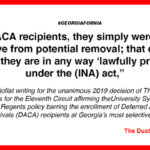





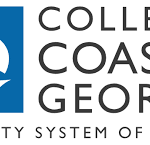
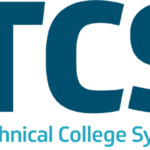













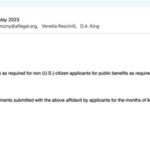
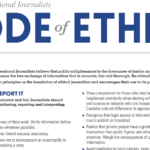










You must be logged in to post a comment.